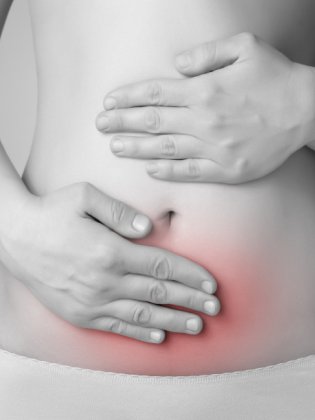Chronic pelvic pain
Definition, symptoms and treatments
What is chronic pelvic pain?
Chronic pelvic pain is a frequent cause for consultation. Chronic pain is pain that has lasted for more than six months. Due to the wide range of possible diagnoses, we use a multidisciplinary approach to treat this type of pain.
What should I know about the pelvis?
The pelvis is located below the abdomen, between the hips and the perineum. It encompasses several organs such as the urinary tract, the reproductive organs and the rectum, as well as bones, including the coccyx and the sacrum.
These organs may be affected by abnormalities or diseases which cause pelvic pain.
What are the symptoms of pelvic pain?
Pelvic pain can originate in any of the pelvic organs. It may be located in the:
- Perineum (from the pubis to the coccyx, including the genital organs)
- Muscles (obturator internus syndrome, piriformis syndrome)
- Bones (coccyx, pubis)
- Internal organs (urethra, bladder)
In addition to pain in the lower abdomen, patients might be sensitive to touch in the pelvic area. The pain can radiate toward the lumbar region as well as the thighs and groin.
It can be acute or chronic, sudden or constant. Pelvic pain is described as chronic when symptoms have lasted for more than four to six months.
Chronic pain can significantly interfere with a patient’s daily professional and family life. As a result, it can even lead to mental health issues such as depression. This further exacerbates the pain, creating a vicious cycle.
A patient-centric, multidisciplinary approach must therefore be used to treat chronic pelvic pain.
What are the risk factors and causes of chronic pelvic pain?
Chronic pelvic pain risk factors increase when the patient has:
- A history of inflammatory pelvic disease
- Experienced a difficult pregnancy or childbirth
- Undergone abdominal surgery or radiation therapy
- Problems relating to infertility
- Antecedents of physical or sexual abuse
In women, pelvic pain is frequently associated with menstrual cramps. It coincides with her period and recurs every month. The pain is usually not a cause for concern and can be relieved with analgesics.
However, there are many other reasons for chronic pelvic pain in both men and women:
- Bladder disorders (stones, cystitis)
- Ovarian disorders (ovarian cyst, polycystic ovary syndrome, endometriosis)
- Uterine disorders (uterine fibroids, adenomyosis, cervical cancer)
- Pelvic congestion syndrome / pelvic varicose veins)
- Chronic pelvic pain syndrome / chronic prostatitis
- Large intestine disorders (gastroenteritis, constipation, colon cancer)
- Pregnancy (miscarriage)
- Musculoskeletal disorders (tearing of abdominal muscles, fibromyalgia)
- Cancer of various organs
In addition, mental factors such as depression and stress can contribute to this type of chronic pain. However, they are rarely the sole cause for pelvic pain.

How is pelvic pain diagnosed at the American Hospital of Paris?
Many different disorders can cause chronic pelvic pain. At the American Hospital of Paris, pelvic and perineal pain is diagnosed by a multidisciplinary team.
The doctor asks the patient about his or her pain and personal as well as family medical history. An array of exams can then be suggested to determine the root cause of your chronic pain:
- Patient history and clinical exam: to determine the most likely causes and appropriate tests
- Blood and urine analyses: to determine whether your pelvic pain is being caused by an infection, kidney stone or pregnancy
- Abdominal and pelvic ultrasound: to view the organs and detect any tumors or cysts
- Pelvic Doppler to search for pelvic varicose veins
- Pelvic MRI: to search for endometriosis, fibroids, tumors
- Laparoscopy: this exam is only performed on rare occasions; a center specializing in pelvic pain will typically determine the cause without the need to use laparoscopy.
What treatment options are available for chronic pelvic pain at the American Hospital of Paris?
Once chronic pelvic pain has been diagnosed, the treatment will focus on its cause. The goal is to treat the disorder causing the pain, in order to eliminate the pain.
Chronic pelvic and perineal pain requires specific, multidisciplinary treatment. This may involve various pelvic pain specialists, such as urologists, vascular doctors, radiologists, Doppler ultrasound specialists, interventional radiologists, gynecologists, gastroenterologists, neurosurgeons, physical rehabilitation doctors, psychiatrists, physiotherapists, osteopaths, sophrologists and acupuncturists. At the American Hospital of Paris, all of these highly specialized practitioners receive chronic pelvic pain training and work collaboratively. We offer a coordinated, personalized care pathway ensuring patient-centric treatments.
Depending on the cause of your pain, our team will recommend the most appropriate treatment for you.
The American Hospital of Paris is a pioneer in minimally invasive techniques such as pelvic varicose vein embolization, endometrioma sclerotherapy, peripheral nerve blocks and peripheral nerve stimulation by ultrasound-guided pulsed radiofrequency. Our teams offer effective, scar-free treatments that systematically include rehabilitation therapies.


